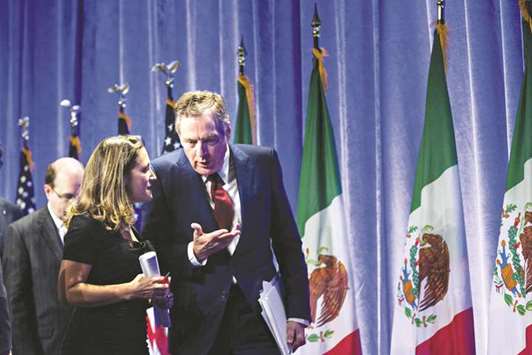The United States drew a hard line for renegotiating the North American Free Trade Agreement yesterday, demanding major concessions aimed at slashing trade deficits with Mexico and Canada and boosting US content for autos.
At the start of talks in Washington, US President Donald Trump’s top trade adviser, Robert Lighthizer, said Trump was not interested in “a mere tweaking” of the 23-year-old pact, which Trump has threatened to scrap without major changes.
“We feel that Nafta has fundamentally failed many, many Americans and needs major improvement,” Lighthizer, the US trade representative, said at the start of the talks, which reflected Trump’s relentless criticism that Nafta has caused massive US manufacturing job losses.
Lighthizer put Mexico and Canada on notice that the United States would use its clout as their biggest export customer to wring concessions, saying the United States wanted substantially tougher rules of origin, including a requirement of “substantial US content” for autos.
He also signalled a fight over Nafta’s trade dispute settlement system for changes that would allow more anti-dumping duties against Canada and Mexico, saying this provision should “respect our national sovereignty.”
Canadian Foreign Minister Chrystia Freeland suggested earlier this week that her country could walk away if the United States insisted on scrapping the “Chapter 19” trade dispute settlement system that requires the use of binational panels.
In her opening statement, Freeland took a swipe at the US fixation on cutting its trade deficits, saying: “Canada does not view trade surpluses or deficits as a primary measure of whether a trading relationship works.
US-Canada-Mexico trade has quadrupled since Nafta took effect in 1994, surpassing $1tn in 2015.
Lighthizer blamed Nafta for a direct loss of 700,000 US manufacturing jobs since the pact took effect in 1994, a period that coincides with increasing automation across all industries that has allowed more output with fewer workers.
Auto industry groups have warned against changing the pact’s rules of origin, which govern how much of a product’s components must originate from Nafta countries.
They said the pact has allowed them to build a competitive North American supply base that has helped boost exports of US-assembled vehicles globally.
The pact also has massively boosted US farm income by increasing agricultural exports to both Mexico and Canada.
“We do not want them to use us as a trading tool and to do harm to the agricultural sector in all three countries,” the president of the American Farm Bureau Federation, Zippy Duvall, told a news conference yesterday. Corporate chief executives have been sounding “do no harm” warnings on Nafta for months.
Trump’s relationship with business executives became a high-profile issue this week as he disbanded two business advisory councils after several CEOs quit in protest over his remarks blaming weekend violence at a rally in Virginia on the protesters who opposed white nationalists as well as the white nationalists themselves.
Canadian and Mexican officials at the Nafta talks yesterday declined to weigh in.
Asked if there was concern that the political upheaval around Trump could impact the Nafta talks, Mexico’s finance ministry undersecretary, Vanessa Rubio, said: “These are internal issues of the United States.” Freeland refused to be drawn into the US political furore during a news conference before she returned to Ottawa.
The first round of Nafta talks, which will last until Sunday, are expected to focus on consolidating the proposals and demands from all three countries.
The long list of US demands could make it difficult for negotiators to reach agreement on modernisation plans that also are expected to include new chapters on digital and energy trade, and environmental, labour and currency standards.
Both Freeland and Mexican Economy Minister Ildefonso Guajardo pushed back at the US demands and defended Nafta.
Guajardo said Nafta should be modernised to produce more trade among its participants, not less, and needed more than one winner.
“For a deal to be successful, it has to work for all parties involved.
Otherwise, it is not a deal,” Guajardo said.
Guajardo later told a news conference that it was “too soon” for the three countries to begin narrowing their differences.
He said it was not a good idea to add country-specific content requirements to the agreement.
Mexico is keen to maintain preferential access for its goods and services to the United States and Canada, where nearly 85% of its exports are shipped.
Its Nafta priorities also include greater integration of the continent’s labour markets and energy sectors.
Weighing heavily over the talks is the 2018 Mexico presidential election.
Mexico has urged all sides to complete the negotiations before the campaign ramps up in February to avoid having them become a political punching bag.

Bob Lighthizer, US trade representative (right), speaks to Chrystia Freeland, Canada’s minister of foreign affairs, during the first round of North American Free Trade Agreement (Nafta) renegotiations in Washington, DC, on Wednesday. u201cWe feel that Nafta has fundamentally failed many, many Americans and needs major improvement,u201d Lighthizer said at the start of the talks, which reflected Trump’s relentless criticism that Nafta has caused massive US manufacturing job losses.
